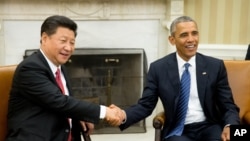President Barack Obama and his Chinese counterpart, Xi Jinping, said Friday that they were committed to creating a bilateral investment treaty between the world's two largest economies.
At a joint news conference after talks at the White House, Obama said the two countries had agreed to "step up our work toward a high-standard bilateral investment treaty," which he said would help level the playing field for American companies.
Obama said Xi also discussed his "commitment to accelerate market reforms, avoid devaluing China’s currency, and have China play a greater role in upholding the rules-based system that underpins the global economy — all of which are steps we very much support."
Xi said he and Obama agreed to "vigorously push forward" the bilateral investment treaty negotiation.
White House officials said the investment treaty was a "top economic priority" for the two nations.
The treaty would open up closed sectors of China's economy and could lay the groundwork for a free-trade agreement.
Xi described China and the United States as "highly complementary economically" and said there was a "huge potential for further cooperation." He said the two countries had agreed to increase coordination to promote global economic growth.
"To this end, we have established the mechanism on regular phone conversation on economic affairs between China and the United States, which will be led by Vice Premier Wong Yang of China and Secretary of the Treasury Jacob Lew. They will stay in close communication on respective and global major economic issues," Xi said.
Xi also told reporters that there was no reason to expect China's yuan would depreciate against the U.S. dollar over the long run, saying his country was working to stabilize economic growth.
"Challenges and difficulties have obviously increased, but what we are taking is proactive fiscal policy and prudent monetary policy," he said. He said the steps to be taken would stabilize growth, promote reform, improve people's livelihood and fend off risks.
China's economic growth has slowed recently, cutting demand for imports and shaking global stock markets.





